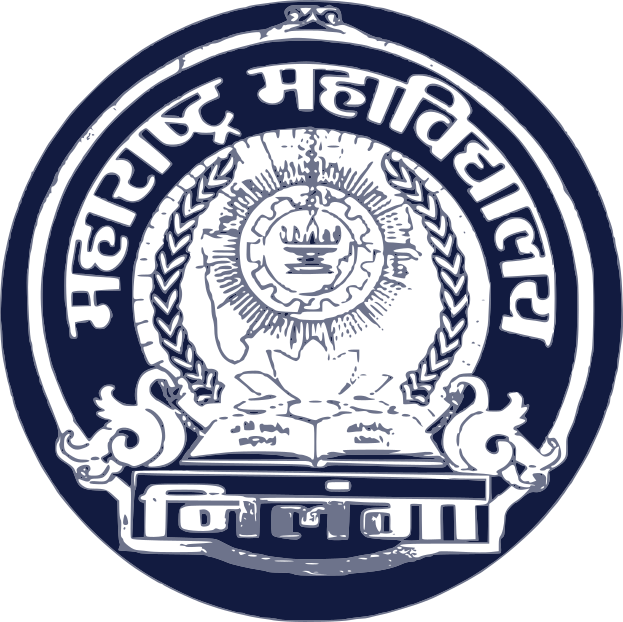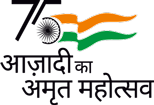Department of Chemistry
About the Department:
The inception of the Department of Chemistry dates back to 1970, when it emerged as a pioneering addition to the Science Department. Its primary goal was to deliver top-notch education in traditional scientific disciplines while evolving into a hub for both teaching and research endeavors, aspiring to carve a distinguished niche within India’s academic landscape. The department currently provides an undergraduate UG course in Chemical Sciences and is slated to commence postgraduate PG courses in Organic chemistry stating from June 2024.
Department organized various student-oriented activities such as poster presentation, power point presentation, Science quiz. The students are monitored and evaluated by regular class tests, seminars, assignments, and mid and end-semester examinations.
The department has its own well equipped laboratory including chemicals, reagents, glassware, basic instruments for performing experiments in physical, inorganic, organic and analytical chemistry. We have oven, UV-Vis spectroscopy instruments, Mansingh surivmeter and all the analytical tools like Conductometer, pH meter, Calorimeter, Potentiometer. Also, the department was awarded with multiple major and minor UGC projects during 2006-2012. Our vision
- Faculty
| Sr. NO. | NAME OF THE FACULY | DESIGNATION | DATE OF JOINING | EXPERIENCE | C.V. |
| 1 | Dr. J. K. Dawle | Former Professor (Retd.) | 07/08/1989 | ||
| 2 | Mr. S. G. Kulkarni | Associate professor
(Retd.) |
08/08/1989 | ||
| 3 | Mr. R. N. Hiremath | Assistant professor | 04/05/2023 | 10 months | |
| 4 | Dr. D. O. Biradar | Assistant professor | 01/06/2023 | 09 months | |
| 5 | Mr. V. S. Yedle | Assistant professor | 03/07/2023 | 08 months | |
| 6 | Mrs. Firdos A. Bagwan | Assistant professor | 11/09/2023 | ||
| 7 | Mr.P Chandrashekher | Associate professor | 02/07/1988 |
- Faculty Awards/Achievements /Recognition
| Sr. No. | Name of the Faculty | Year | Title of the Award/Achievement /Recognition | Awarded by |
| 1 | Dr. D. O. Biradar | 2017 | Doctor of philosophy | S.R.T.M.U. Nanded |
| 2 | ||||
| 3 | ||||
| 4 |
- PROGRAMMES OFFERED
| Sr. No. | Name of the Programme | In-take Capacity | Duration | Programme Outcomes |
| 1. | B. Sc. Chemistry | 3 years | Students will be empowered with basic to advance knowledge of organic and in organic chemistry. The core course would help to enrich the subject knowledge of the students and increase their confidence level in the field of both academia and industry. | |
| 2. | Skill Enhancement course | 1 yr | The introduction of Skill Enhancement Courses (SEC) would help to gain more powerful knowledge not only in their core Chemistry subject but also in interrelated multidisciplinary subjects both theoretically and practically. |
- Courses Offered
| Year | Semester | Titles of the Courses | Course Outcomes |
| B. Sc. F.Y. | I | 1. Inorganic Chemistry | 1. Able to write electronic configuration of given atomic number. 2. Able to tell the name of orbitals by recognizing shapes of orbitals. 3. Able to calculate bond order of different molecules. 4. Able to draw MO diagrams of different molecules. 5. Able to draw structures of different ionic solids. |
| 2. Organic Chemistry | 1. Recognize and draw constitutional isomers, stereoisomers, including enantiomers and diastereomers, racemic mixture and meso compounds. 2. Know the fundamental principles of organic chemistry and predict outcomes and derive mechanism of various types of organic reactions. 3. Understand various types of reactive intermediates and factors affecting their stability. 4. Understand the nomenclature, synthesis, isomerism and physical properties of alkanes and cycloalkanes | ||
| 3. Physical Chemistry | 1. Students should be able to describe the characteristic of the three states of matter.
2. Students should be able to describe the different physical properties of each state of matter. 3. Students should be able to determine the difference between solids, liquids and gases. 4. Students will be able to define what matter is and where you can find it. 5. Students will be able to give examples of solids, liquids and gases. |
||
| II | 1. Inorganic Chemistry | 1. The students will be able to design and carry out scientific experiments as well as accurately record and analyze the results of experiments. 2. Students will be able to explain why chemistry is an integral activity for addressing social, economic and environmental problems. 3. Students will be skilled in problem solving, critical thinking and analytical reasoning as applied to scientific problems. 4. The students will be able to describe the periodic table as a list of elements arranged so as to demonstrate trends in their physical and chemical properties. 5. The students will able to state the principle resemblances of elements within each main group in particular alkali metals, alkaline earth metals, halogens and noble gases. | |
| 2. Organic Chemistry | 1. Recognize the basic practical skills for the synthesis of alkenes, alkynes, alkyl halides. 2. Able to predict the reactivity of organic compound from its structure. 3. Able to understand the rules for naming different organic compounds 4. Able to recognize mechanism for given chemical reaction. | ||
| 3. Physical Chemistry | 1. State the basic principles electrochemistry 2. Mention and explain various methods for the determination of transport number. 3. Explain the concepts of electrolytic conduction and dilution 4. Understand rate of reaction and factors affecting it. 5. Derive integrated rate expressions for zero order, first order, second order and third order reaction. 6. Understand theories of reaction kinetics and differentiate them. | ||
| B. Sc. S.Y. | III | 1. Inorganic Chemistry | 1. The students will be able to explain the fundamental concepts in coordination chemistry of transition metals. 2. The Students should be familiar with the basic knowledge of the non-aqueous solutions and applications of non-aqueous solvents in analytical chemistry. 3. The students will develop the ability of effective solving practical problem of analytical chemistry of non-aqueous solutions. 4. Students will be able to describe different quantitative methods of analysis of organic and inorganic substances. 5. Students will be able to demonstrate methods of drugs analysis and pharmaceutical calculations. |
| 2. Organic Chemistry | 1. Able to recognize structures of acid halides, esters, amides, acid anhydrides. 2. Able to convert given name of alcohol to structure. 3. Able to write the order of reactivity of different carboxylic acid derivatives. 4. Able to describe different classes of alcohols. 5. Able to write down structure of phenol and phenoxide ion. | ||
| 3. Physical Chemistry | 1. Recognize the basic terms of thermodynamic. 2. Able to predict the energy change in heat capacities at constant volume and pressure and their relationship. 3. Able to drive Joule’s law and its application. 4. Able to derive relationship between modification of distribution law when solute undergoes dissociation 5. Able to recognize the degree of hydrolysis and hydrolysis constant of aniline hydrochloride. | ||
| IV | 1. Inorganic Chemistry | 1. By quantitative analysis courses, the students will learn to understand, communicate and interpret quantitative information and mathematical ideas. 2. All should able to develop skills in the recognition of patterns, generalization, abstraction to a formal system and application of the system to specific situations. 3. The students will be able to understand the various uses of lanthanides elements in flash light powders and in dying cotton. 4. The students will be able to understand about recently lanthanides have been used in lasers. 5. The students will be able to know about actinides elements are used as nuclear fuels for various purposes. | |
| 2. Organic Chemistry | 1. Students are able to recognize mechanism of different reactions related to carbonyl compounds. 2. Students are able to differentiate between given different amines. 3. Able to recognize different functional groups by given only graph of peaks. 4. Able to write mechanism of different condensation reaction. 5. Able to recognize the reactivity of substituted aromatic amines. | ||
| 3. Physical Chemistry | 1. Recognize the basic concepts of thermodynamics 2. Able to predict the reversible and irreversible reaction 3. Able to understand the physical significance of third law of thermodynamics 4. Able to recognize the reaction of electrochemical cells and types | ||
| B. Sc. T.Y. | V | 1. Inorganic Chemistry | 1. Recognize the bonding in transition compounds by VBT and CFST theories. 2. Able to predict the geometry of coordination compounds and type of hybridization. 3. Able to determine the properties and preparations of Li, Al, Hg, Sn, Ti etc. metal compounds. 4. Able to recognize the biological reaction alkali and alkaline earth metals, nitrogen fixation, hemoglobin and myoglobin. |
| 2. Organic Chemistry | 1. After study of course students have firm foundations in the fundamentals and application of current chemical and scientific theories. 2. Students are able to identify and solve chemical problems and explore new areas of research. 3. Students are skilled in problem solving, critical thinking and analytical reasoning. 4. After completion of course students should have the ability to identify organic compounds by analysis and interpretation of spectral data. 5. Students should have the ability to explain common terms in NMR spectroscopy such as chemical shift, coupling constant and anisotropy and describe how they are affected by molecular structure. | ||
| 3. Physical Chemistry | 1. Able to recognize different regions for different spectroscopy. 2. Able to explain the concept of Electromagnetic Waves. 3. Able to explain the concept use in Black Body Radiation. 4. Able to calculate dipole moment in given molecules. 5. Able to use concept of polarizability. | ||
| VI | 1. Inorganic Chemistry | 1. Students are able to describe role of different metal ions in biological system. 2. Students are able to recognize role of porphyrin ring in hemoglobin. 3. Students are able to count total of electrons in organometallic compound. 4. Students come to know about uses of different inorganic polymers in making of tiers, toys, plastics bags. 5. Students are able to name different organometallic compounds. | |
| 2. Organic Chemistry | 1. The students should be able to demonstrate advanced knowledge and understanding in aspect of protein structure. 2. The students will be able to introduce about basic chemistry of the heterocyclic. 3. The students will get familiar with particular properties and reactions for the most important heterocyclic as well as different systems of nomenclature. 4. The students will develop fundamental theoretical understanding of heterocyclic chemistry. 5. The students will be able to fully comprehend the chemistry of many heterocyclic products, carbohydrate, amino acids, peptides, proteins and lipids in use such as drugs and food. | ||
| 3. Physical Chemistry | 1. Recognize the basic rules of electronic spectroscopy. 2. Able to predict the term symbols of diatomic molecules 3. Able to understand the behaviour of ideal and non-ideal solutions 4. Able to recognize the thermodynamics of one and two component system 5. Recognize the basic rules of various component system |
- Results
| Sr. No. | Academic Year | No. of Students Enrolled | No. of Students Appeared for Exam | Passed | Failed | Percentage of Result |
| 1. | 2019-20 | 139 | 107 | 32 | 76.97 | |
| 2. | 2020-21 | 127 | 118 | 09 | 92.91 | |
| 3. | 2021-22 | 117 | 76 | 41 | 64.95 | |
| 4. | 2022-23 | 108 | 95 | 13 | 80.50 | |
| 5. | 2023-24 |
- Students’ Achievements/ Merits
| Sr. No. | Academic Year | Name of the Student | % or Award or Achievement |
| 1 | 2019-20 | 1. | |
| 2. | |||
| 3. | |||
| 2 | 2020-21 | 1. | |
| 2. | |||
| 3. | |||
| 3 | 2021-22 | 1.Shweta Salunke | Qualified S.R.T.M. University, Nanded entrance exam. |
| 2.Priyanka Ingale | Qualified S.R.T.M. University, Nanded entrance exam. | ||
| 3. | |||
| 4 | 2022-23 | 1. Rutuja Mashalkar | Univ. topper in chemistry sub and BOS member of university |
| 2. Rachna Hajare | Univ. topper in overall B.Sc. course | ||
| 3. Rutuja Birajdar | Qualified Pune University entrance exam | ||
| 5 | 2023-24 | ||
- Best Practices of the Department
| Sr. No. | Title of the Best Practice | Photos | |
| 1 | Amazing chemistry |  |
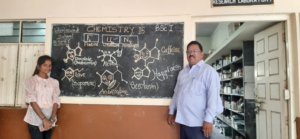 |
| 2 | Seminars | 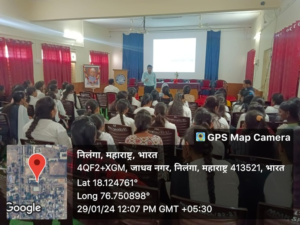 |
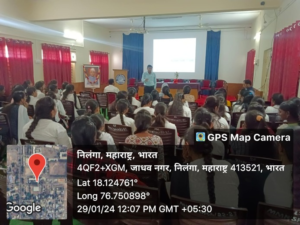 |
| 3 | Poster presentation | 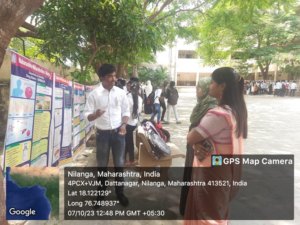 |
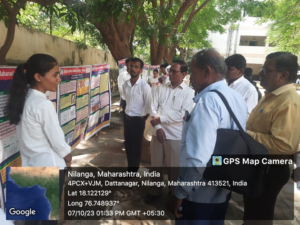 |
- Notable Alumni
| Sr. No. | Name of the Alumni | Present Designation |
| 1. | Dr. Santosh Panchal | Research Associate |
| 2. | Mr. Balaji Sagare | R & D, SunPharma |
| 3. | Mr. Vasant G. Kulkarni | Principal, Sainik school, Udgir |
| 4. | Mr. Datta Shahir | Headmaster |
| 5. | Mr. Sanjay Ingale | News reporter |
